The Foundation – Must-Have Kitchen Tools Every Home Needs
In 2025, the kitchen is more than just a place for cooking—it’s a high-functioning zone of creativity, wellness, and efficiency. The right kitchen tools make all the difference between frustration and mastery, whether you’re a beginner or a seasoned chef. In this part, we’ll cover the foundational gear that no home kitchen should be without.
1. Chef’s Knife
Use: Precision cutting of meats, vegetables, and herbs.
Why it’s essential: The chef’s knife is the cornerstone of your kitchen arsenal. A high-quality chef’s knife improves safety, speed, and accuracy.
Pro Tip: Choose a knife with a full tang and balanced weight. Regularly hone and sharpen for best performance.
2. Cutting Boards (Wood & Plastic)
Use: Safe food preparation for meats, vegetables, and bread.
Why it’s essential: Prevents cross-contamination and protects countertops. Wood for veggies and bread; plastic for meat and seafood.
Pro Tip: Use color-coded boards and clean thoroughly after each use.
3. Measuring Cups and Spoons
Use: Accurate measurement of dry and liquid ingredients.
Why it’s essential: Precision is critical for baking and consistent results.
Pro Tip: Look for stainless steel sets with engraved measurements that won’t fade.
4. Mixing Bowls (Various Sizes)
Use: Mixing ingredients, marinating meats, and food prep.
Why it’s essential: A versatile and frequently used item. Stackable sets save space.
Pro Tip: Stainless steel bowls resist stains and odors better than plastic.
5. Non-Stick Frying Pan
Use: Cooking eggs, pancakes, and delicate items.
Why it’s essential: Prevents sticking, reduces the need for oil, and eases cleanup.
Pro Tip: Never use metal utensils; wash by hand to preserve coating.

Modern Kitchen Tools 2025
6. Cast Iron Skillet
Use: Searing, baking, frying, and oven roasting.
Why it’s essential: Versatile, durable, and enhances flavor with use.
Pro Tip: Season regularly and avoid soap during cleaning to maintain non-stick surface.
7. Saucepan with Lid
Use: Cooking grains, sauces, reheating soups.
Why it’s essential: A workhorse for everyday stovetop tasks.
Pro Tip: Choose one with a thick base and snug lid for even heating.
8. Stock Pot
Use: Boiling pasta, making soup, broth, or chili.
Why it’s essential: Allows cooking in large batches, saving time and energy.
Pro Tip: Look for models with measuring marks and pour spouts.
9. Baking Sheet (Sheet Pan)
Use: Roasting vegetables, baking cookies, toasting nuts.
Why it’s essential: Incredibly versatile; use it daily.
Pro Tip: Get a rimmed heavy-duty aluminum version; pair with silicone mats for non-stick performance.
10. Colander
Use: Draining pasta, washing vegetables.
Why it’s essential: Speeds up prep and makes cleanup easier.
Pro Tip: Choose one with sturdy handles and a stable base.
11. Vegetable Peeler
Use: Peeling carrots, potatoes, apples, etc.
Why it’s essential: Saves time and prevents injuries compared to knives.
Pro Tip: Look for swivel models with ergonomic grips.
12. Grater (Box or Microplane)
Use: Shredding cheese, zesting citrus, grating garlic or nutmeg.
Why it’s essential: Adds flavor and texture to dishes.
Pro Tip: Microplanes are better for zest and fine ingredients; box graters for volume.
13. Tongs
Use: Flipping meat, serving salad, grabbing pasta.
Why it’s essential: Acts like an extra pair of hands without piercing food.
Pro Tip: Silicone-tipped tongs are safe for non-stick pans.
14. Whisk
Use: Blending, emulsifying, whipping.
Why it’s essential: Aerates mixtures and ensures smooth textures.
Pro Tip: Balloon whisks are great for whipping; flat whisks suit sauces.
15. Spatula (Rubber and Metal)
Use: Scraping, folding, flipping.
Why it’s essential: Critical for baking and stovetop cooking.
Pro Tip: Use rubber for batters and sauces, metal for grilling and flipping.
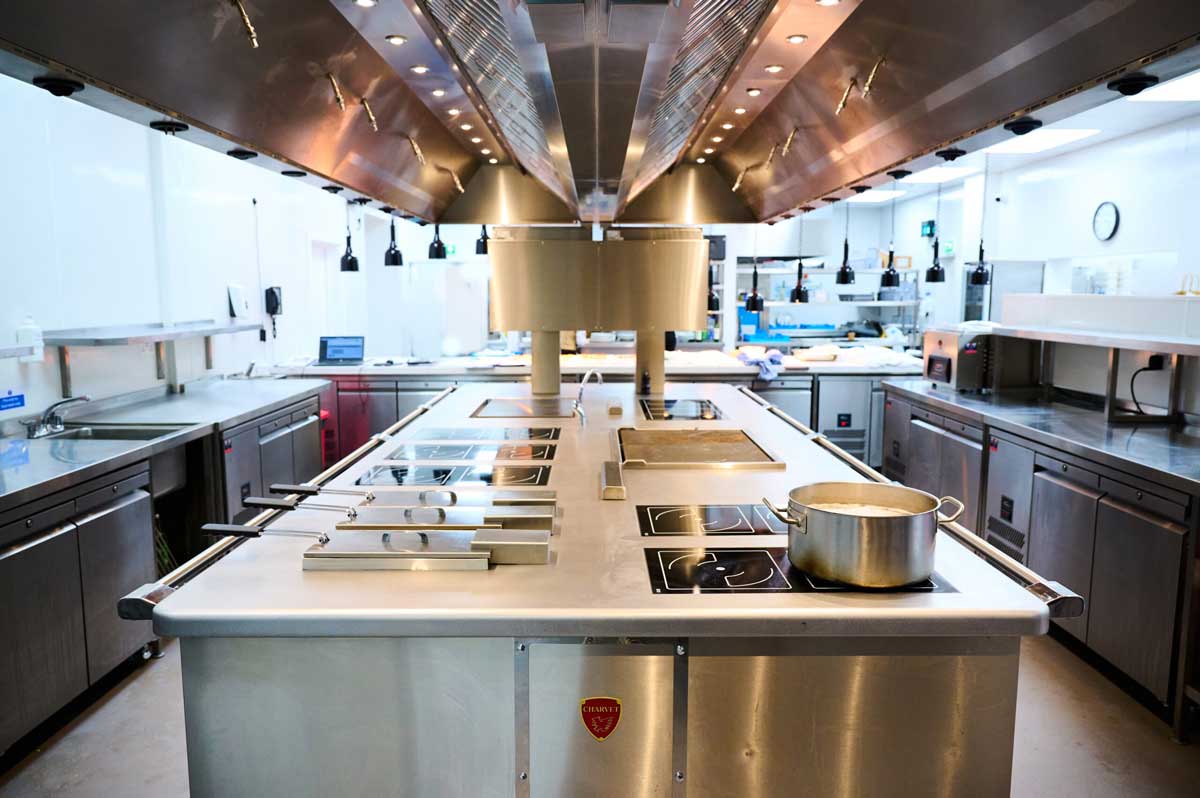
Mastering Kitchen Design: Space, Style, and Smart Appliances for Your Home
Table: Core Kitchen Tools – Comparison of Use & Material
| Tool Name | Best Use | Ideal Material | Bonus Tip |
|---|---|---|---|
| Chef’s Knife | Cutting everything | High-carbon steel | Keep sharpened weekly |
| Cutting Board | Chopping, slicing | Wood or plastic | Use different ones for meat/veg |
| Measuring Tools | Precision in baking | Stainless steel | Engraved measures last longer |
| Mixing Bowls | Prep and marinating | Stainless steel | Get nesting sets with lids |
| Frying Pan | Delicate cooking | Non-stick aluminum | Avoid high heat to preserve it |
Advanced Kitchen Tools That Elevate Your Cooking Game
Once the basics are in place, it’s time to bring your cooking skills up a notch. This section explores more specialized kitchen equipment that enhances your efficiency, consistency, and creativity in the kitchen.
16. Immersion Blender (Hand Blender)
Use: Blending soups, sauces, and smoothies right in the pot.
Why it’s essential: Saves time and reduces mess—no need to transfer hot liquids to a blender.
Pro Tip: Choose a model with multiple speed settings and dishwasher-safe parts.
17. Food Processor
Use: Chopping, slicing, shredding, making dough or nut butter.
Why it’s essential: Replaces several manual prep tools and works faster.
Pro Tip: Invest in one with a powerful motor and multiple blade attachments.
18. Stand Mixer
Use: Kneading dough, whipping cream, mixing batters.
Why it’s essential: Essential for bakers and cooks who prepare large batches.
Pro Tip: Attachments like pasta rollers or meat grinders add value.
19. Instant Pot / Multi-Cooker
Use: Pressure cooking, slow cooking, rice cooking, and yogurt making.
Why it’s essential: A multi-function appliance that saves time and kitchen space.
Pro Tip: Great for meal prepping and cooking tougher cuts of meat quickly.
20. Digital Kitchen Scale
Use: Precise weighing of ingredients for recipes.
Why it’s essential: Especially useful in baking where ratios are key.
Pro Tip: Look for tare function and switchable units (grams/ounces).
21. Mandoline Slicer
Use: Uniformly slicing vegetables and fruits.
Why it’s essential: Delivers professional-quality cuts quickly and safely.
Pro Tip: Always use the hand guard and consider models with adjustable thickness.
22. Pasta Maker
Use: Rolling and cutting fresh pasta.
Why it’s essential: Lets you create fresh, personalized pasta at home.
Pro Tip: Manual models are more affordable and durable than electric ones.
23. Garlic Press
Use: Crushing garlic cloves.
Why it’s essential: Saves time and keeps your hands free of garlic smell.
Pro Tip: Rinse immediately after use to prevent clogging.
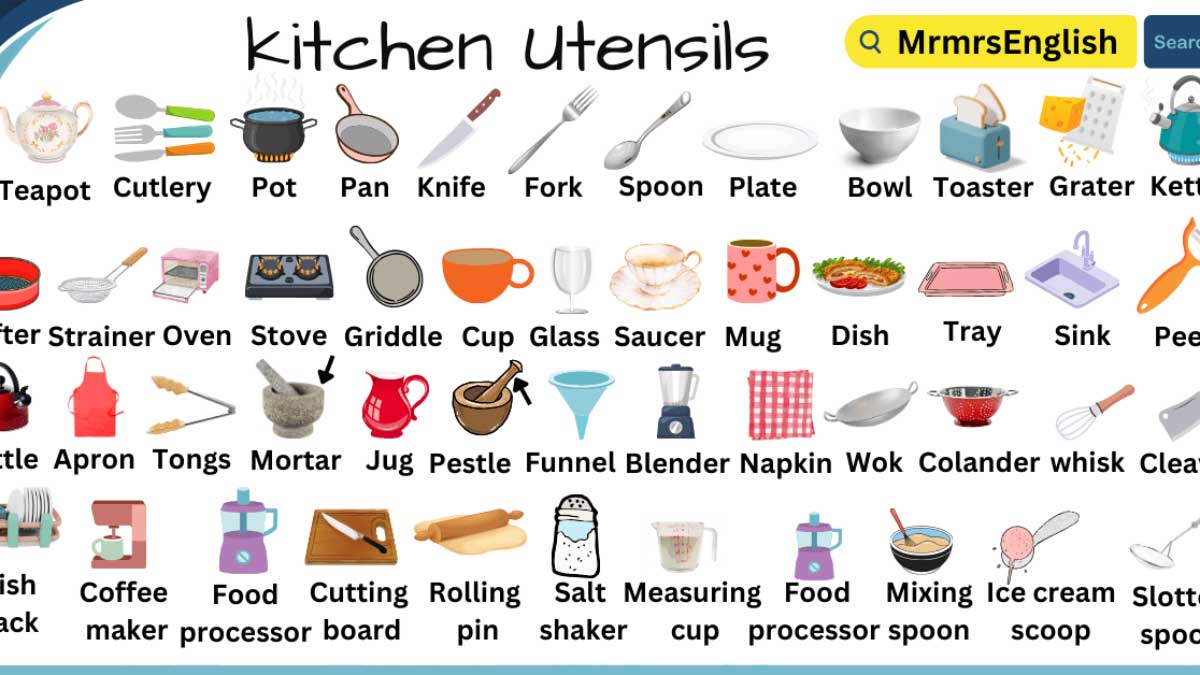
Essential Kitchen Tools and Accessories: The Ultimate Guide for 2025
24. Salad Spinner
Use: Washing and drying greens quickly.
Why it’s essential: Keeps salads crisp and avoids soggy leaves.
Pro Tip: Doubles as a large mixing bowl in a pinch.
25. Kitchen Shears
Use: Snipping herbs, trimming meat, opening packages.
Why it’s essential: Stronger and more precise than household scissors.
Pro Tip: Choose models with detachable blades for easy cleaning.
Table: Advanced Kitchen Tools Overview
| Tool Name | Function | Time Savings | Skill Boost |
| Immersion Blender | Soup & sauce blending | High | Medium |
| Food Processor | Prep & blending | High | High |
| Stand Mixer | Baking & mixing | Medium | High |
| Instant Pot | Multi-style cooking | High | High |
| Kitchen Scale | Measuring | Medium | High |
Specialty Tools and Gadgets That Add Gourmet Flair
26. Mandoline Slicer
If you’re serious about presentation and uniform cuts, a mandoline slicer is a must. This tool allows for ultra-thin, even slices of fruits, vegetables, or cheese — perfect for scalloped potatoes, apple chips, or garnishes. Look for models with adjustable thickness and hand guards for safety.
Pro Tip: Use it for paper-thin cucumber slices in sushi or salad.
27. Sous Vide Precision Cooker
For precision temperature control and juicy, perfectly cooked meals, the sous vide method has taken the culinary world by storm. A sous vide cooker heats water to a set temperature, cooking food in a vacuum-sealed bag for ideal results.
Use Case: Steaks, salmon, poached eggs, and even desserts like custards.
28. Stand Mixer
A must-have for serious bakers, the stand mixer mixes dough, whips cream, kneads bread, and even grinds meat (with attachments). Invest in one with multiple speed settings and a sturdy build.
Popular Brands: KitchenAid, Cuisinart
29. Spiralizer
A great tool for healthy cooking, a spiralizer transforms vegetables into noodle-like strands. Make zucchini noodles (zoodles), sweet potato spirals, or curly fries with ease.
Why You’ll Love It: Encourages low-carb cooking and boosts veggie intake.
30. Food Dehydrator
If you’re into preserving food or healthy snacking, a dehydrator allows you to make your own jerky, dried fruits, or veggie chips. Look for models with adjustable temperature settings.
Good For: Campers, fitness enthusiasts, or anyone who loves natural snacks.
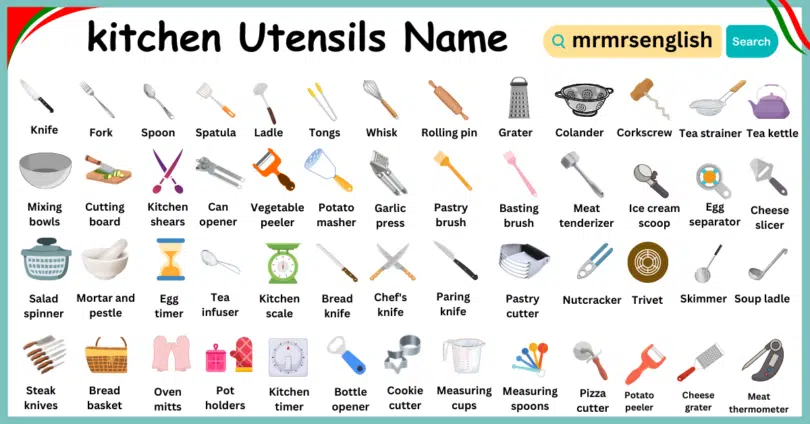
Essential Kitchen Tools: Must-Haves for Every Home Chef
31. Induction Cooktop
Portable and energy-efficient, an induction burner offers rapid heating without an open flame. It’s perfect for small kitchens, dorms, or as an extra burner during big holiday meals.
Compatibility: Only works with magnetic cookware (cast iron, stainless steel).
32. Pasta Maker
Homemade pasta tastes better — and it’s easier to make than you think. A pasta maker can roll and cut dough into spaghetti, fettuccine, and more. Manual and electric versions are available.
Pair It With: A drying rack for freshly made noodles.
33. Espresso Machine
Take your coffee game to the next level with a home espresso machine. Whether manual or automatic, these devices offer café-quality espresso, cappuccinos, and lattes.
Bonus Tools: Milk frother, coffee grinder, and tamper.
34. Raclette Grill
Bring the restaurant experience home. A raclette grill melts cheese while cooking meats and vegetables simultaneously. It’s ideal for family dinners or small parties.
Pro Tip: Serve with potatoes, cured meats, and pickles for a true Swiss experience.
35. Waffle Maker
Make breakfast more exciting with a waffle iron. Choose a Belgian-style maker for thick, fluffy waffles, or a thin-style for crispy textures. Non-stick surfaces and temperature controls are key features.
Creative Uses: Waffle cornbread, hashbrowns, or cinnamon rolls.
📊 TABLE: Gourmet Tools & Their Best Uses
| Tool | Best Use | Price Range | Ideal For |
|---|---|---|---|
| Mandoline Slicer | Uniform thin slices | $20 – $80 | Salads, chips, presentation |
| Sous Vide Cooker | Precision low-temp cooking | $80 – $200 | Steak, eggs, fish |
| Spiralizer | Veggie noodles | $15 – $40 | Paleo, keto, veggie lovers |
| Dehydrator | Food preservation | $40 – $200 | Snacks, camping, prepping |
| Pasta Maker | Homemade pasta | $30 – $150 | Home chefs, families |
36. Crepe Pan
Thin and perfectly browned crepes are only possible with the right tool. A nonstick crepe pan with low sides allows for effortless flipping and even heating.
Tip: Use a wooden spreader for uniform batter distribution.
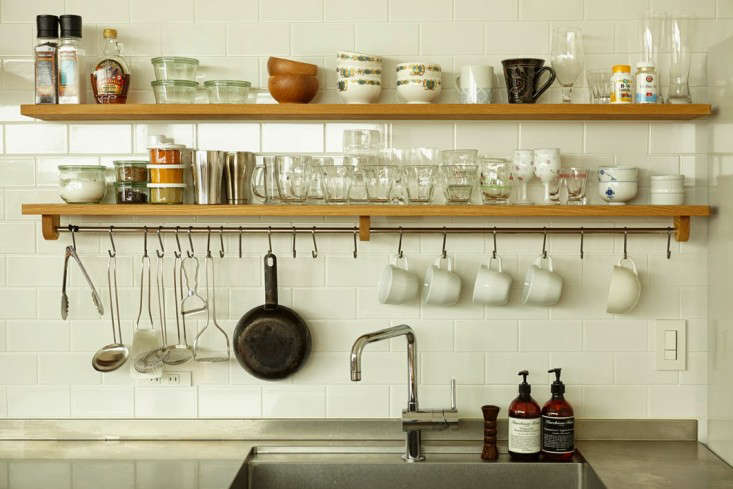
Kitchen Items A to Z — Ultimate Guide to 2025 Essentials
37. Griddle Plate
Perfect for pancakes, grilled sandwiches, and large breakfasts, a cast iron or nonstick griddle fits over your stove burners and provides ample space.
Bonus: Some are double-sided with grill ridges.
38. Ice Cream Maker
Homemade ice cream = pure happiness. An ice cream maker can whip up endless flavors and allows full control of sugar and dairy content. Choose compressor or freezer bowl types.
Creative Variations: Sorbet, gelato, frozen yogurt.
39. Tortilla Press
Fresh tortillas make a massive difference. A cast iron tortilla press lets you quickly flatten dough for tacos, quesadillas, or wraps.
Pair With: A griddle or skillet to cook them right away.
40. Meat Grinder
Control your cuts and fat content by grinding meat at home. Manual or electric, a meat grinder lets you make burgers, sausages, or pet food your way.
Pro Tip: Always partially freeze meat before grinding for best results.
41. Kitchen Torch
Add restaurant flair to your desserts and proteins. A culinary torch is ideal for crème brûlée, searing meats, or melting cheese.
Safety First: Choose one with a lock and adjustable flame.
42. Zoodle Maker
While similar to a spiralizer, a zoodle maker is dedicated to making perfect zucchini noodles. Great for keto and gluten-free cooking.
Why It Matters: Consistency in size improves cook time and presentation.
43. Vacuum Sealer
Preserve ingredients, marinate quickly, or prep for sous vide. A vacuum sealer removes air from bags to extend freshness.
Bonus Use: Store cheese, freeze fruits, or organize leftovers.
44. Citrus Press
Get every last drop without the mess. A handheld citrus press is better than squeezing by hand and adds more juice to your drinks, salads, and sauces.
Material Matters: Go for stainless steel over plastic.
45. Food Mill
Ideal for pureeing soups, sauces, and baby food, a manual food mill separates skin and seeds from soft produce.
Alternative To: Electric blenders, especially for rustic textures.

50+ Essential Kitchen Tools and How to Use Them Like a Pro
🛠️ 46. Pasta Machine
Use: Rolling and cutting fresh pasta dough.
Why It Matters: For fresh, restaurant-quality pasta at home.
Pro Tip: Look for a machine with adjustable thickness settings. It makes a huge difference in texture and cooking time.
Pro-Level Use: Add fresh herbs like basil or spinach into your dough before rolling for gourmet flavor and color.
🛠️ 47. Digital Kitchen Scale
Use: Measuring ingredients by weight for precision.
Why It Matters: Accuracy is key in baking and portion control.
Pro Tip: Always zero out the weight after placing the bowl—this is called “tare” and prevents measurement errors.
Pro-Level Use: Use to weigh individual servings for meal prep or macro tracking.
🛠️ 48. Dough Scraper / Bench Scraper
Use: Handling, dividing, and cleaning dough from counters.
Why It Matters: Saves time during prep and helps achieve uniform dough portions.
Pro Tip: Also great for transferring chopped food from cutting board to pan.
Pro-Level Use: Chill it in the fridge briefly before use to keep soft doughs from sticking.
🛠️ 49. Silicone Food Covers
Use: Eco-friendly alternative to plastic wrap.
Why It Matters: Stretchy, reusable, and perfect for sealing bowls, pots, and cut fruits.
Pro Tip: Use them over halved melons or open cans—they cling naturally and prevent spills.
Pro-Level Use: Store them near the fridge for fast access during post-meal cleanup.
🛠️ 50. Rice Cooker (Advanced or Smart Type)
Use: Cooking rice, quinoa, grains, and even steaming.
Why It Matters: Consistent, perfect results without babysitting the pot.
Pro Tip: Use the “quick” setting for fluffy rice in under 20 minutes.
Pro-Level Use: Cook oatmeal, soups, or steamed buns using programmable settings.
🛠️ 51. Egg Cooker
Use: Boils, poaches, or steams eggs to desired doneness.
Why It Matters: Perfect eggs every time without guesswork.
Pro Tip: Many models can also steam small veggies like broccoli.
Pro-Level Use: Use to prep a dozen eggs for week-long breakfast meal prep.
🛠️ 52. Handheld Milk Frother
Use: Frothing milk for lattes and cappuccinos.
Why It Matters: Brings barista-quality foam to your home drinks.
Pro Tip: Heat milk slightly for better foam.
Pro-Level Use: Also great for mixing protein powders or salad dressings.
🛠️ 53. Cast Iron Griddle
Use: Versatile cooking surface for pancakes, steaks, burgers.
Why It Matters: Durable, evenly heats, and adds flavor over time.
Pro Tip: Season it well and never use dish soap for cleaning.
Pro-Level Use: Use two heat zones—one side high, the other medium—for pro-level searing and finishing.
🛠️ 54. Jar Opener (Multi-Grip or Electric)
Use: Opens stubborn jar lids effortlessly.
Why It Matters: Saves wrist strain and time, especially for the elderly.
Pro Tip: Rubber-lined grips or battery-powered openers work best.
Pro-Level Use: Keep one in a drawer near dry storage—ideal for nut butters and pickled goods.
🛠️ 55. Kitchen Torch
Use: Caramelizing sugar, searing meats, melting cheese.
Why It Matters: Adds a gourmet finish to dishes.
Pro Tip: Always check fuel level before starting.
Pro-Level Use: Perfect for brulée, torching meringues, or finishing sous-vide proteins.
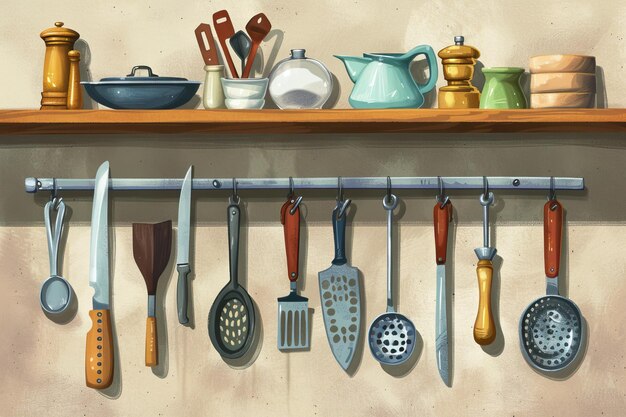
Ultimate Kitchen Tools Guide 2025
📊 Mini Table: Pro vs. Basic Tool Upgrade
| Tool | Basic Version | Pro/Advanced Version | Upgrade Benefits |
|---|---|---|---|
| Kitchen Scale | Manual analog | Digital with tare & grams | Precision & easier cleanup |
| Rice Cooker | Single switch | Smart w/ delay timer | Multi-purpose cooking |
| Milk Frother | Plastic wand | Rechargeable stainless | Stronger froth & durability |
| Jar Opener | Rubber grip | Electric jar opener | Effortless use for arthritis |
| Cast Iron Griddle | Flat | Reversible w/ ridges | Grilling marks & better drainage |
📚 Bonus: Storage Tips for Long-Term Tool Life
-
Use drawer dividers to organize tools by category (e.g., cutting, baking, measuring).
-
Hang frequently-used items on a magnetic strip or wall hooks.
-
Keep instruction manuals in a clear binder in the pantry—you’ll thank yourself later.
-
Regularly inspect tools for rust, cracks, or dullness—replace or sharpen as needed.
-
Oil cast iron and wooden tools once a month to maintain surface quality.
✅ Conclusion: Equip Your Kitchen, Empower Your Cooking
In 2025, the modern kitchen is more than just a place to prepare meals — it’s a hub of creativity, efficiency, and wellness. The 50+ essential kitchen tools we’ve explored are not merely gadgets, but transformative extensions of your culinary skills. From basic must-haves like spatulas and measuring cups to advanced equipment such as sous vide machines and smart rice cookers, each item plays a role in saving time, enhancing flavor, and reducing effort.
Investing in the right tools isn’t about luxury — it’s about practicality, performance, and passion. When your kitchen is stocked with the right equipment, cooking becomes not just easier, but deeply satisfying.
Whether you’re meal-prepping on a Sunday night or entertaining a table full of guests, these tools equip you to cook like a pro, regardless of your experience level.
So, command your culinary battlefield with confidence, knowing that your tools are as sharp, precise, and hardworking as you are. 🔪👨🍳
❓ Frequently Asked Questions (FAQ)
Q: How should I prioritize which kitchen tools to buy first?
A: Start with versatile basics like a chef’s knife, cutting board, measuring cups, and non-stick skillet. Then move to specialty tools based on your cooking style (e.g., pasta machine, sous vide).
Q: What’s the difference between high-carbon and stainless steel knives?
A: High-carbon knives stay sharper longer and are easier to hone but may rust if not cared for. Stainless steel is rust-resistant but dulls faster. Many pro chefs prefer high-carbon for daily use.
Q: How often should I replace kitchen tools?
A: Quality tools can last years. Replace plastic tools every 1–2 years, non-stick pans every 3–5 years, and sharpen knives every 6 months or as needed.
Q: Can I use smart appliances without a smart home system?
A: Absolutely. Many smart tools, like Wi-Fi rice cookers or Bluetooth thermometers, work via phone apps without full smart-home integration.
Q: Are expensive tools really worth it?
A: Not always. Focus on durability and functionality. A $25 stainless steel bench scraper may outperform a $70 one with gimmicks.
Q: What is the best way to organize all these tools?
A: Use labeled drawer dividers, wall-mounted holders for knives or spatulas, and vertical pan organizers. Keep rarely used tools stored away to declutter work surfaces.
Q: Should I buy kitchen tool sets or individual items?
A: Tool sets can save money but often include items you won’t use. Invest in individual, high-quality pieces based on your specific cooking needs.

High-Performance Kitchen Tools
📚 Sources & References (All Updated for 2024–2025)
-
Wirecutter: Best Kitchen Gear (Reviewed March 2025)
🎥 Bonus: Video — “25 Genius Kitchen Tools That Actually Work in 2025”
Watch this YouTube video for a visual roundup of the most functional, smart, and time-saving kitchen gadgets of 2025.


